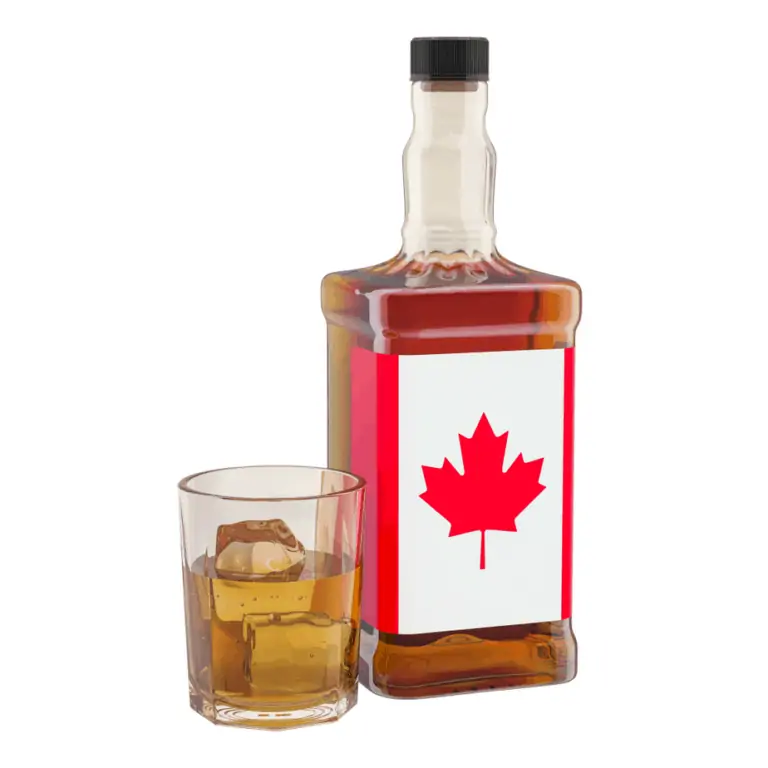The Pros and Cons of Canadian Whisky

Known for its smooth, easy-drinking style, Canadian whisky offers a unique and satisfying experience. While it may not always match the complexity of Scotch or the bold flavors of Bourbon, its versatility and affordability make it a popular choice. However, with its less stringent regulations and inconsistency in quality, not everyone is a fan.
So, let’s separate the wheat from the chaff and compare the pros and cons to determine if it’s the right spirit for you.
The Pros of Canadian Whisky
1. Smooth and Approachable Flavor
You’ll find that one of the defining features of Canadian whisky is its smooth, often lighter flavor profile. Traditionally, it is made with a base spirit distilled from corn or rye, which is then blended with other grain spirits, creating a mellow and approachable character. This makes it a great choice for both new whisky drinkers and those looking for a spirit that’s easy to sip neat or mix in cocktails.
2. High Versatility
Canadian whisky’s light, smooth profile also lends itself to versatility. It’s excellent in classic cocktails like the Whisky Sour, Old Fashioned, or Manhattan, but it also works well in simple highballs with soda or ginger ale. This adaptability makes it a fantastic option for both home bars and cocktails at restaurants or bars.
3. Affordability
Compared to some Scotch or American bourbons, Canadian whisky often comes at a more affordable price point. High-quality Canadian whisky is readily available at various price ranges, making it accessible for those looking for an excellent spirit without breaking the bank.
4. Rich Tradition and Variety
With a long-standing tradition dating back to the 1800s, Canadian whisky is a key part of the country’s heritage. Canadian distilleries, such as Crown Royal and Canadian Club, have been producing whisky for decades, and the craftsmanship behind these brands offers a variety of unique blends and styles. Recently, there has also been a resurgence of craft distillers exploring innovative ways to produce whisky, resulting in a range of flavors, from spicy rye-forward expressions to sweeter corn-based profiles.
5. Rye-Heavy Whiskies
One of the highlights for fans of bold flavors is Canadian rye whisky. Although not all Canadian whiskies are rye-based, those that are showcase a spicier, bolder flavor profile that can stand up well in robust cocktails or be enjoyed neat. For those who appreciate rye, Canadian whisky offers plenty of options.
The Cons of Canadian Whisky
1. Lack of Strict Production Regulations
Unlike Scotch or bourbon, Canadian whisky regulations are less strict. For example, Canadian whisky only requires a minimum aging period of three years and allows the use of flavoring additives, which has led to some criticism that the standards are not as “pure” as other whisky styles. This freedom allows distillers to experiment but sometimes results in inconsistency and a lack of transparency about ingredients and processes.
2. Lighter Flavor Can Feel “Too Subtle” for Some Drinkers
While the smoothness and light character appeal to many, this can be a drawback for whisky enthusiasts looking for something with a more complex or robust flavor profile. Some find Canadian whisky to lack the depth of Scotch or the boldness of American bourbon, particularly those expressions that rely heavily on corn as the base grain.
3. Limited Availability of Premium Options Outside Canada
Although Canadian whisky is widely available, premium Canadian expressions can be harder to find outside Canada. They keep their good stuff up north. While popular brands like Crown Royal are accessible internationally, some of the best craft and high-end options are limited in their distribution, making it challenging for non-Canadian drinkers to explore the full breadth of what Canadian whisky has to offer. On our visit to Alberta a couple months ago I enjoyed a Crown Royal 31-year-old with dinner. I cannot find that here.
4. Less Diversity in Aging Processes
Canadian whisky producers generally age their whisky in used oak barrels, which tend to impart fewer flavors than new oak barrels (commonly used in American bourbon production). This traditional approach means that Canadian whiskies often don’t have the rich, oaky, or smoky characteristics some drinkers expect from other types of whisky. However, some modern Canadian distillers are experimenting with different casks, such as sherry or wine, to add complexity.
5. Underestimated by Connoisseurs
Despite its quality, Canadian whisky has historically been somewhat overlooked by whisky connoisseurs. Part of this may be due to its generally lighter flavor profile and more relaxed regulations, but the reputation lingers. However, this perception is changing, with more attention being given to craft and specialty Canadian whiskies that showcase the potential for depth and uniqueness. Especially their older rye recipes. These are excellent.
Also, note the spelling used of whisky in Canada. They do not use an ‘e.’ This is also true in Scotland and Japan. Whereas here in the US and Ireland, it is spelled whiskey. The difference comes from the translation of words from the Scottish and Irish Gaelic forms.
Canadian whisky has a lot going for it—smoothness, affordability, and versatility are just some of its major strengths. It’s ideal for those who enjoy an easy-sipping whisky or want something adaptable for cocktails. However, if you’re after bold flavors or highly regulated production methods, Canadian whisky may fall short.
Canadian whisky offers something for nearly everyone, from casual drinkers to serious enthusiasts looking for an understated yet complex spirit. As more Canadian distilleries continue to innovate and craft unique expressions, this category of whisky will only grow in variety and prestige. Whether you’re new to whisky or an experienced connoisseur, it’s worth exploring Canadian whisky.
If you’re just getting started, I recommend Caribou Crossing. It’s a Sazerac whisky that holds the distinction of being the world’s first single barrel Canadian whisky. The nose is full of caramel, marshmallow, and a touch of corn, all wrapped in an oak embrace. On the palate, the sweetness continues, with vanilla and caramel taking center stage. A subtle grain note adds complexity, while the finish is short and sweet, leaving a lingering taste of vanilla, oak, and melted marshmallow. Caribou Crossing’s low proof makes it an incredibly easy-drinking whiskey, with a light and airy feel that’s perfect for sipping. It’s a smooth and refined whisky, that is versatile enough to be enjoyed neat, on the rocks, or in cocktails. Give it a try! You won’t be disappointed.

Leave a Reply
Become an insider and receive weekly advice, tips, and insight on all things whiskey
.
Weekly tips, reviews and recommendations to help you enjoy whiskey life to the fullest.
JOIN THE LIST
Sippin' With Jordan Davis
sippin' with the stars
Million Dollar Cowboy Bar WY
old fashioned aF
5 Steps To Sip and Savor Whiskey
whiskey 101
COMMENTS